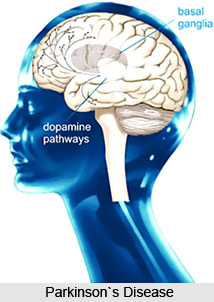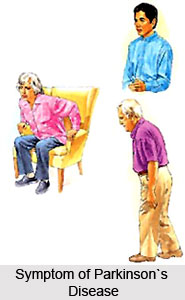 Several primary and secondary symptoms of Parkinson`s disease are not seen equally in everyone with the disease. Different people experience diverse symptoms and the progression of the disease is different from person to person. Most people who get Parkinson`s are above the age of 60, but recently there have been more recognised cases in younger men and women.
Several primary and secondary symptoms of Parkinson`s disease are not seen equally in everyone with the disease. Different people experience diverse symptoms and the progression of the disease is different from person to person. Most people who get Parkinson`s are above the age of 60, but recently there have been more recognised cases in younger men and women.
Parkinson disease affects movement or the motor symptoms of the individual. Other typical symptoms of Parkinson`s disease include disorders of mood, behavior, thinking, and sensation (non-motor symptoms). Patients` individual symptoms may be quite unlike and progression of the disease is also noticeably individual. Most of the symptoms of Parkinson`s disease involve disruption of motor functions (muscle and movement). However, lack of energy, mood and memory changes, and pain can also occur as part of the disease.
Some of the primary symptoms or motor symptoms of Parkinson`s disease are as follows -
•Bradykinesia or Akinesia is the slowness in voluntary movement such as standing up, walking, and sitting down. This happens because of delayed transmission signals from the brain to the muscles. This may direct to difficulty initiating walking, but when more harsh stages of this disease occurs, it may cause "freezing episodes" once walking has begun. Rapid, repetitive movements produce a dysrhythmic and decremental loss of amplitude.
•Tremors often occur in the hands, fingers, forearms, foot, mouth, or chin. Typically, tremors take place when the limbs are not moved as opposed to when there is movement. This is the most apparent and well-known symptom, though an estimated 30% of patients have little perceptible tremor; these are classified as akinetic-rigid.
•Rigidity otherwise known as stiff muscles, often create muscle pain that is increased during movement. In combination with a resting tremor, this produces a ratchety, "cogwheel" rigidity when the limb is passively moved.
•Poor balance happens because of the absence of reflexes that help posture and poise. This causes shaky balance, which oftentimes leads to falling.

There are many more symptoms of Parkinson`s disease that includes gait and posture disturbances; shuffling, where gait is characterised by short steps, with feet barely leaving the ground, producing an audible shuffling noise. Small obstacles tend to cause the patient to trip off the platform very often. Decreased arm-swing and turning "en bloc", rather than the usual twisting of the neck and trunk and pivoting on the toes are quite normal with the Parkinson`s disease patients keep their neck and chest rigid, requiring multiple small steps to complete a turn. Stooped, forward-flexed posture in severe forms, where the head and upper shoulders may be bent at a right angle relative to the trunk (camptocormia) is often seen in such patients. Festination is a combination of stooped posture, imbalance, and short steps. It leads to a gait that gets progressively faster and faster, often ending in a fall.
Gait freezing or "freezing" is a manifestation of akinesia (an inability to move) and an important symptom of Parkinson`s disease. Gait freezing is characterised by an incapacity to move the feet which may worsen in tight, disorderly spaces or when trying to commence movement. Dystonia (in about 20% of cases of Parkinson`s disease) is an abnormal, sustained, painful twisting muscle contraction, often affecting the foot and ankle (mainly toe flexion and foot inversion), which often obstructs movement.
Speech and swallowing disturbances are also symptoms of Parkinson`s disease. Hypophonia or soft speech is where the speech quality tends to be soft, hoarse, and monotonous. Some people with Parkinson`s disease claim that their tongue is "heavy" or have cluttered speech and tends to sound like monotonic speech. Festinating speech refers to excessively rapid, soft, poorly intelligible speech. Drooling is most likely caused by a weak, infrequent swallow and stooped posture. Dysphagia is impaired ability to swallow and can lead to aspiration pneumonia.
Fatigue (up to 50% of cases of Parkinson`s disease); masked faces (a mask-like face also known as hypomimia), with infrequent blinking; difficulty rolling in bed or rising from a seated position are some of the symptoms of Parkinson`s disease. Micrographia (small, cramped handwriting); impaired gross motor coordination; impaired fine motor agility and motor coordination and Akathisia, the inability to sit still are also seen to occur during Parkinson`s disease.
Parkinson`s disease also causes cognitive and mood disturbances and is quite a frequent symptom of the disease. Reviews of depression approximate its occurrence in anywhere from 20-80% of cases. Most studies offer self-report questionnaires such as the Beck Depression Inventory, which clearly analyse physical symptoms. Studies using diagnostic interviews by trained psychiatrists also report lower rates of depression in case of Parkinson`s disease. Often, there is an increased risk for any individual with depression to go on to develop Parkinson`s disease at a later stage. Seventy percent of individuals with Parkinson`s disease diagnosed with pre-existing depressing symptoms go on to develop anxiety. Ninety percent of Parkinson`s disease patients with pre-existing anxiety subsequently develop apathy or abulia.
Cognitive disturbances or symptoms of Parkinson`s disease include slowed reaction time; both voluntary and involuntary motor responses are significantly slowed. Executive dysfunction, characterised by difficulties in allocation of attention, impulse control, set shifting, prioritizing, evaluating the salience of ambient data, interpreting social cues, and subjective time awareness also occurs. Dementia is a later development in approximately 20-40% of all patients, typically initial with slowing of thought and succeeding to difficulties with conceptual thought, memory, and behavioral regulation. Hallucinations, delusions and paranoia may also develop in the patients. Short term memory loss; procedural memory is more common in Parkinson`s disease than declarative memory. However, some of the above cognitive disturbances are improved by dopaminergic medications, while others are actually deteriorated.
Excessive daytime somnolence, initial, intermediate, and terminal insomnia with disturbances in sleep can occur years prior to diagnosis. Perception is also disturbed in Parkinson`s disease. Impaired visual contrast sensitivity, spatial reasoning, color discrimination, convergence insufficiency (characterized by double vision) and oculomotor control. Dizziness and fainting are usually attributable orthostatic hypotension, which is a failure of the autonomic nervous system to regulate blood pressure in response to changes in body position. Reduction or loss of sense of smell (hyposmia or anosmia) is also symptoms of Parkinson`s disease.
The autonomic symptoms of Parkinson`s disease include oily skin and seborrheic dermatitis, urinary incontinence, typically during later disease progression. Nocturia (getting up in the night to pass urine), constipation and gastric dysmotility that are severe enough to endanger comfort and even health are also seen. Altered sexual function, characterised by profound impairment of sexual behavior, orgasm, and drive is found in mid and late Parkinson disease and lastly, weight loss is significant over a period of seven years. The symptoms of Parkinson`s disease are noticeably prevalent among the sufferers, however the extension and severity may differ. These symptoms largely help in diagnosing the disease.




















